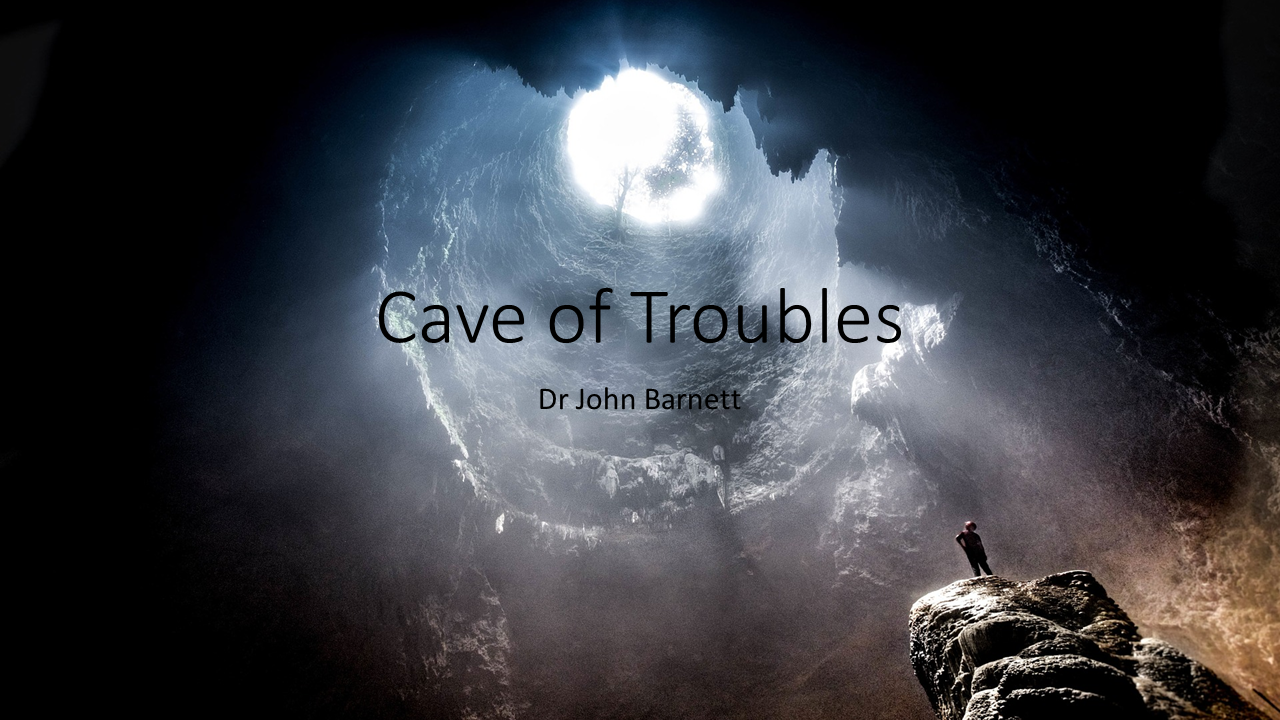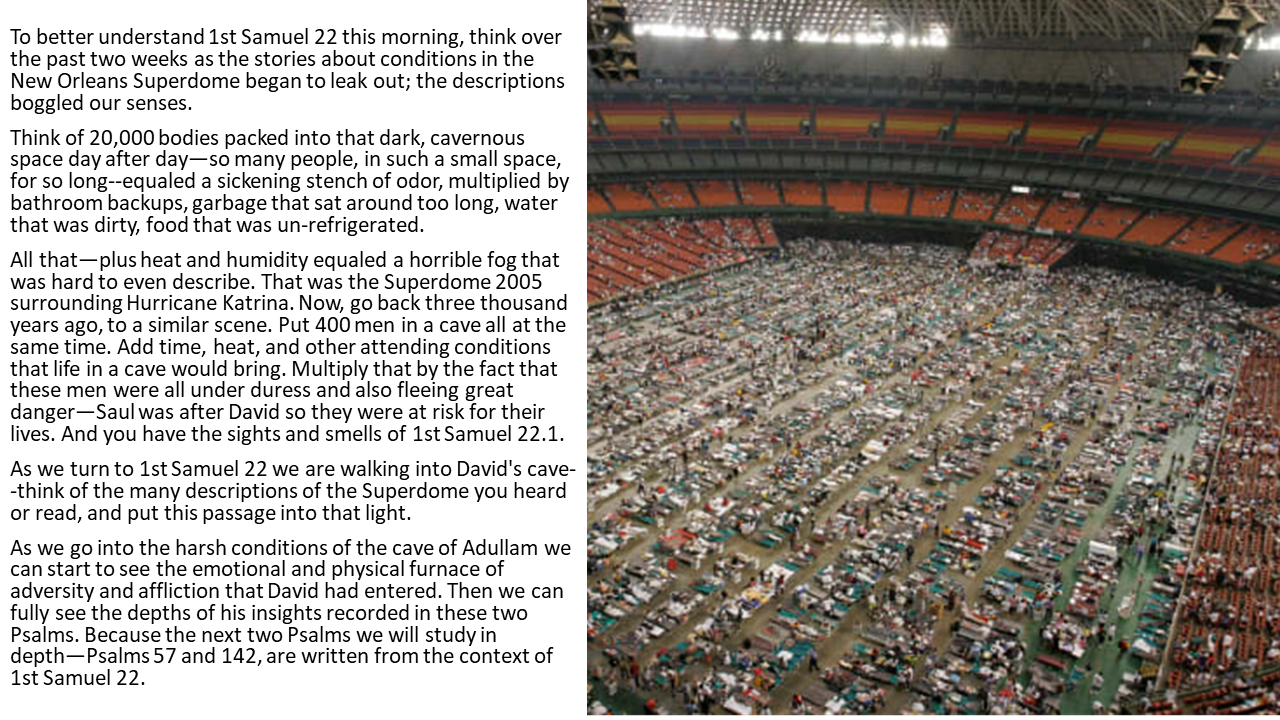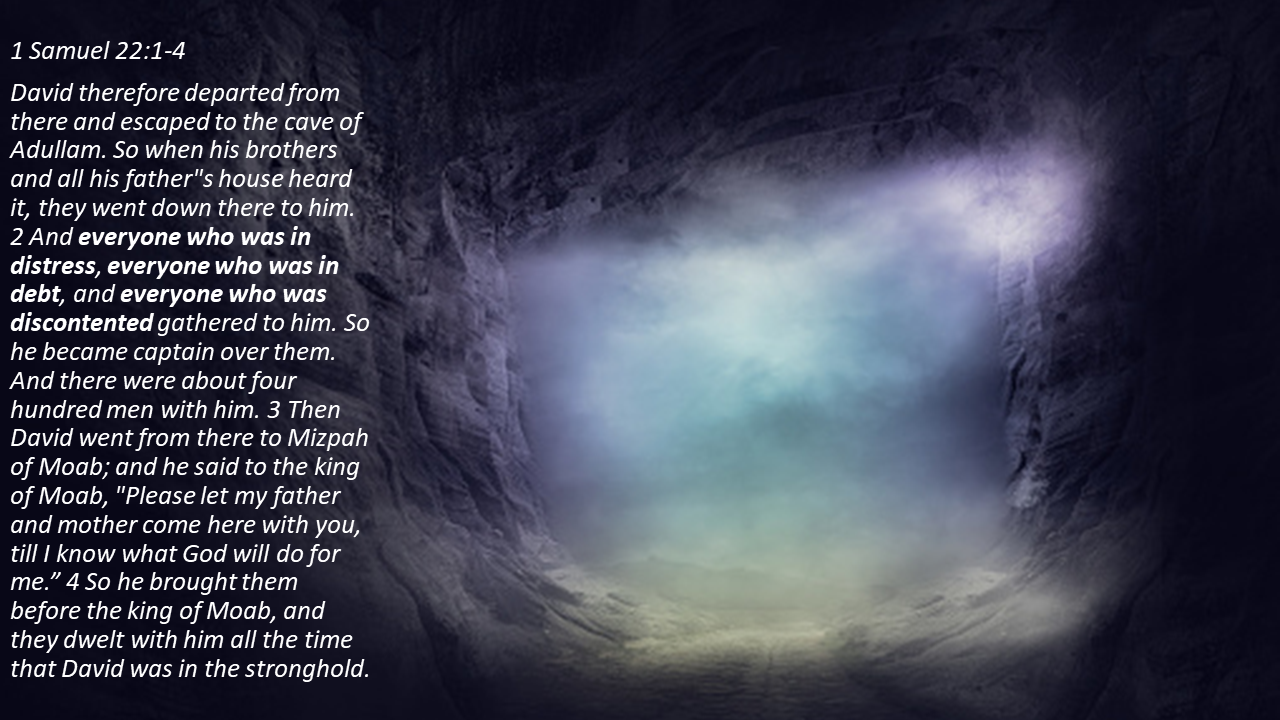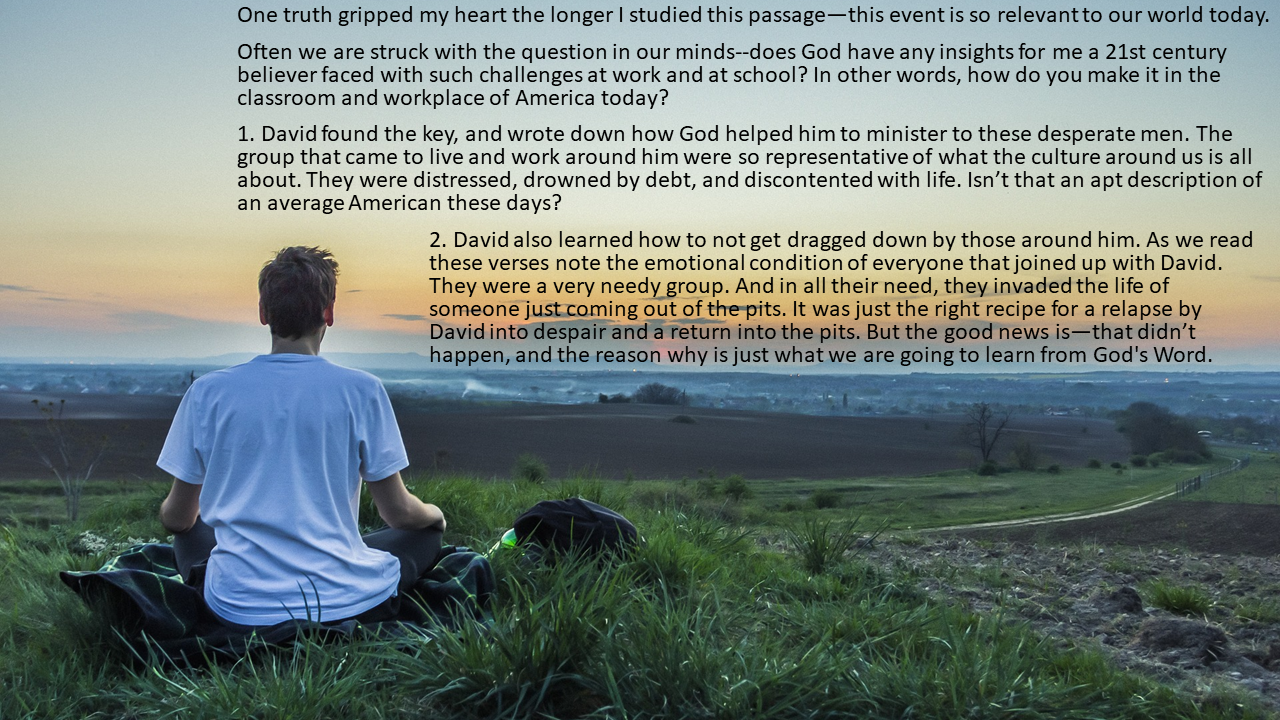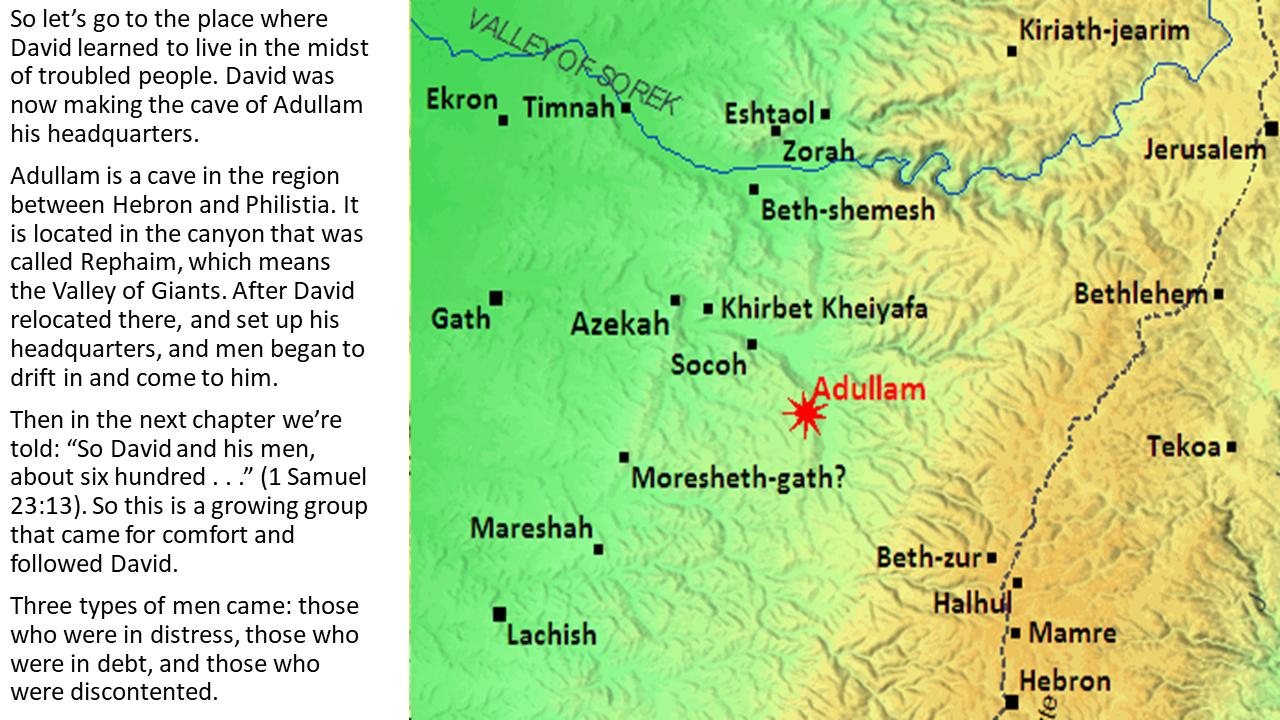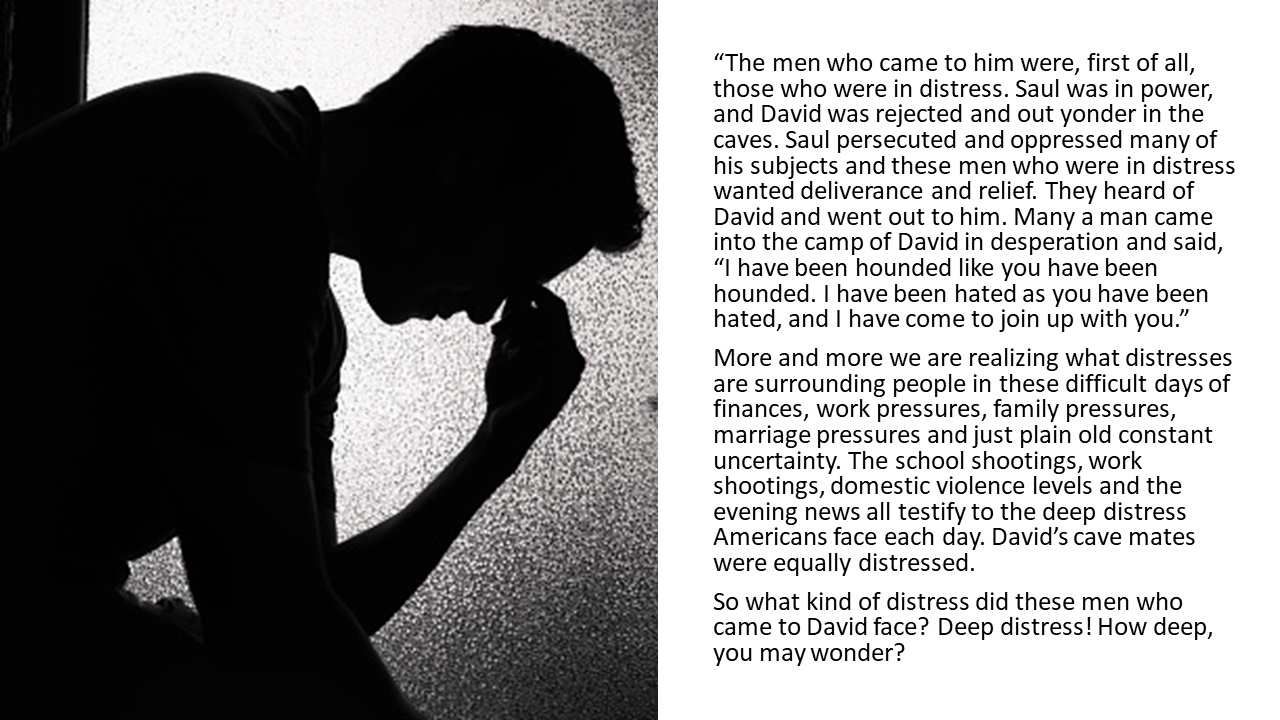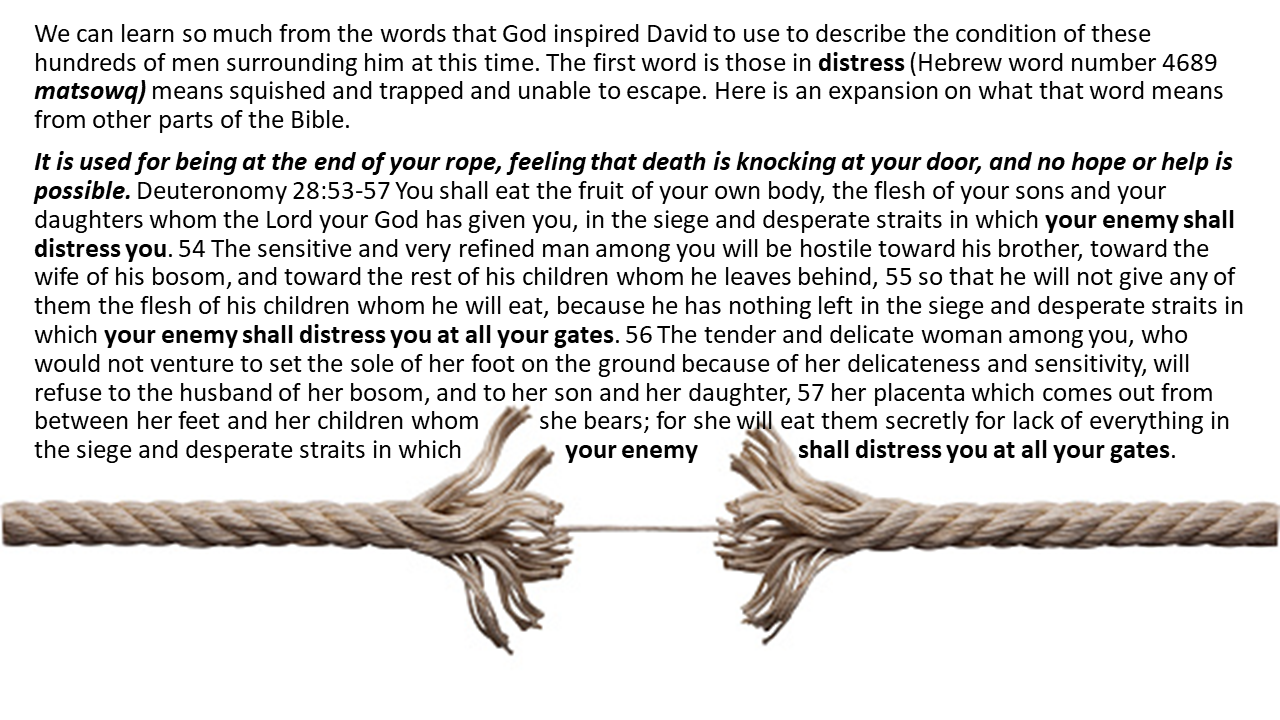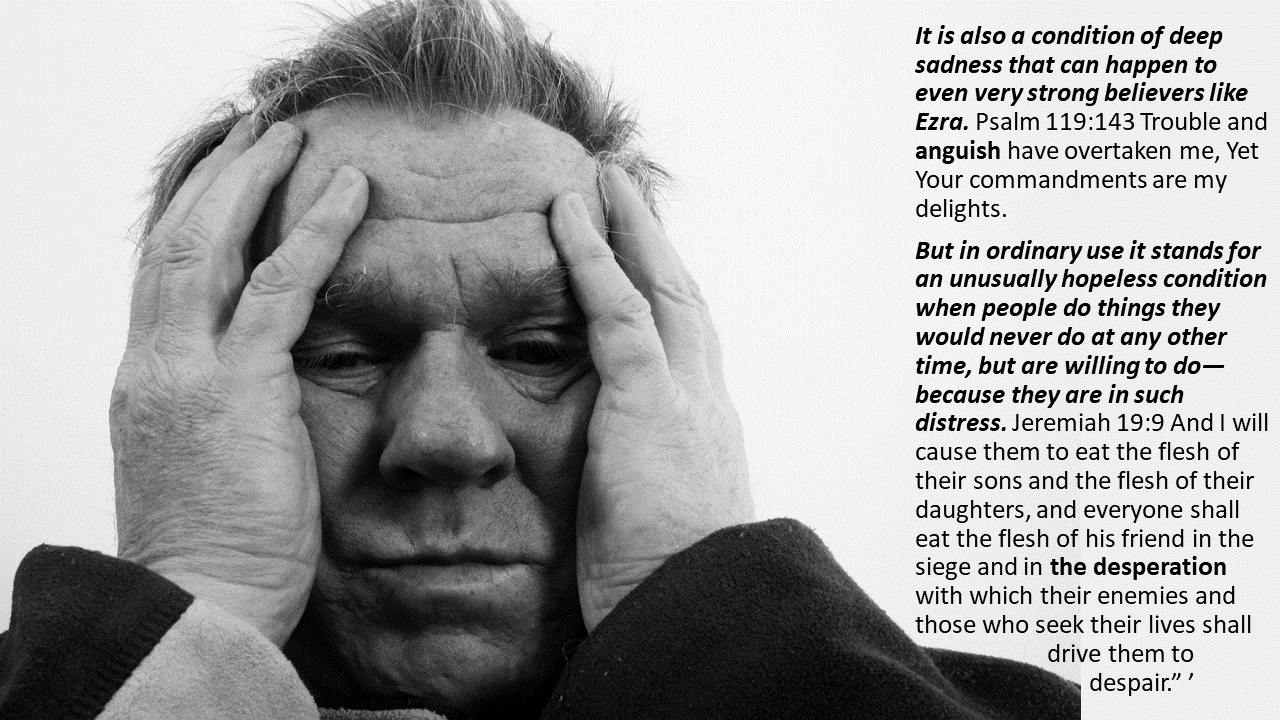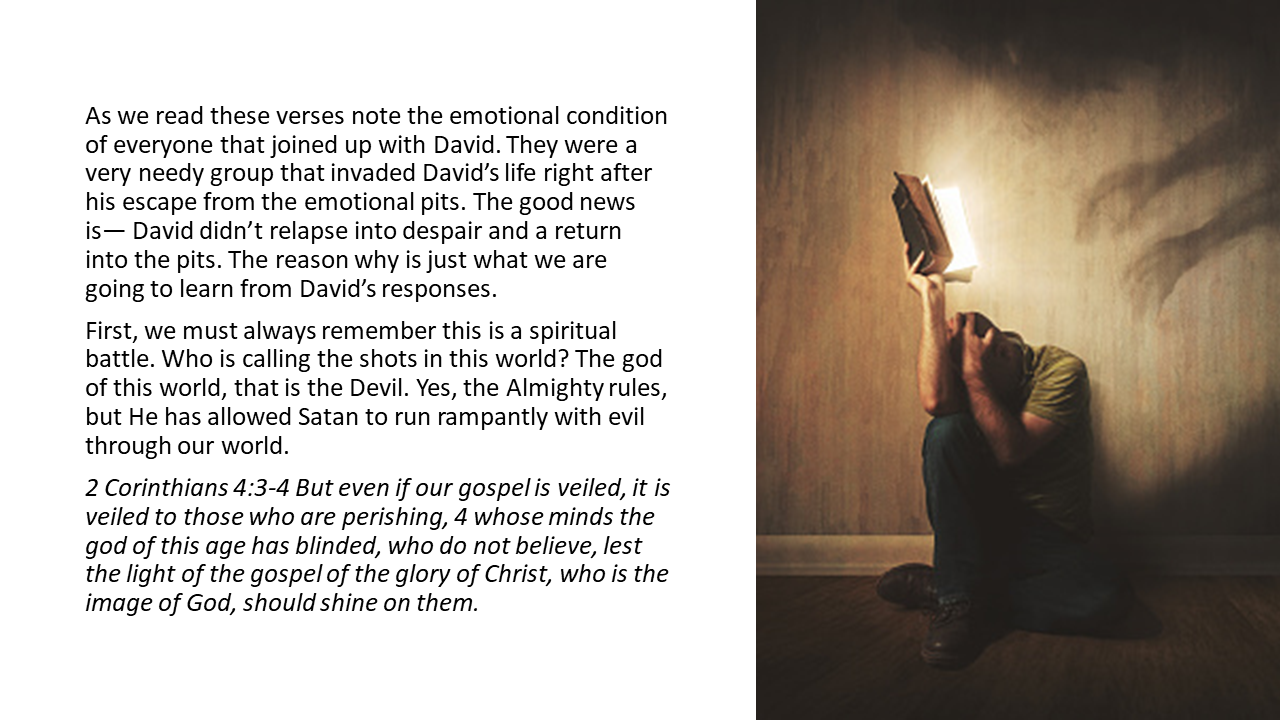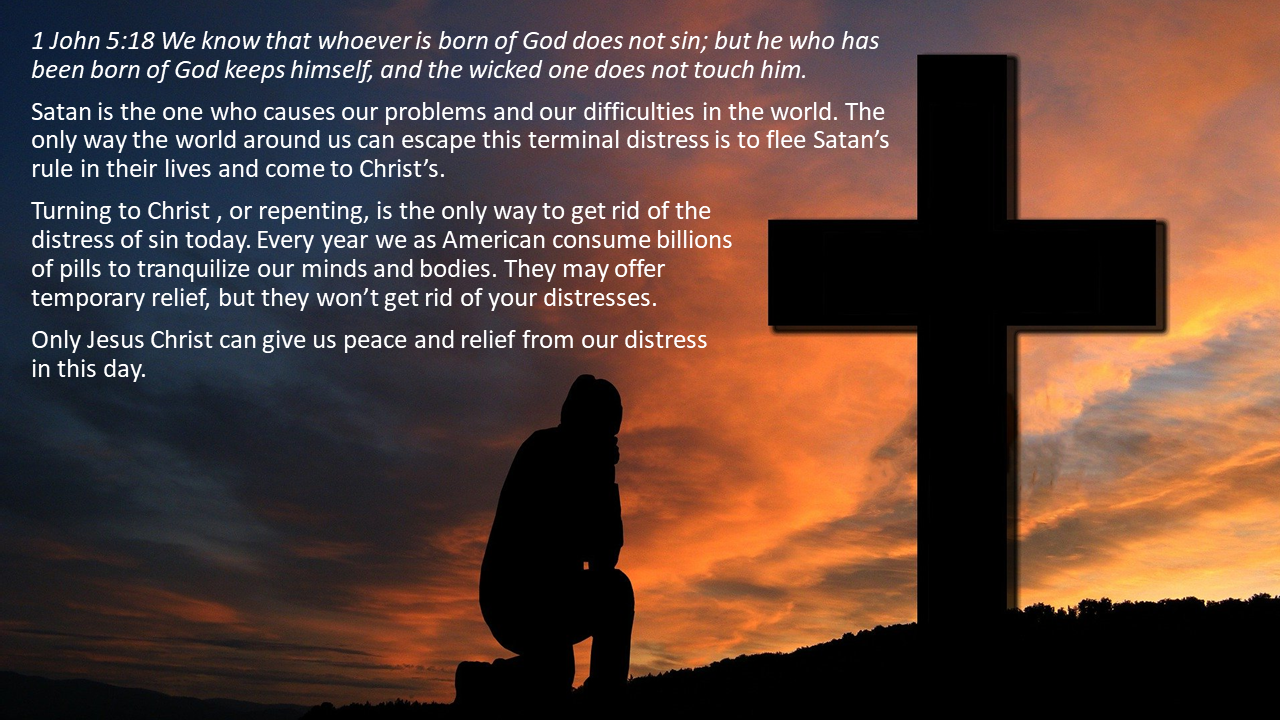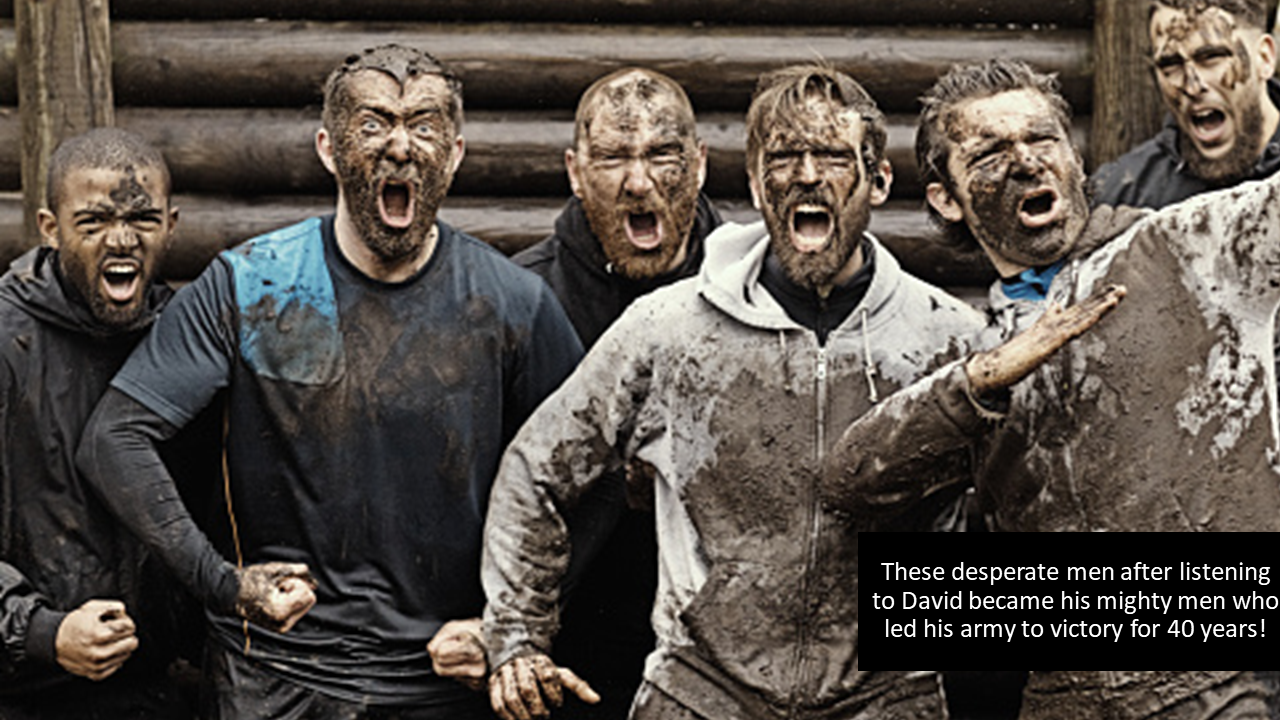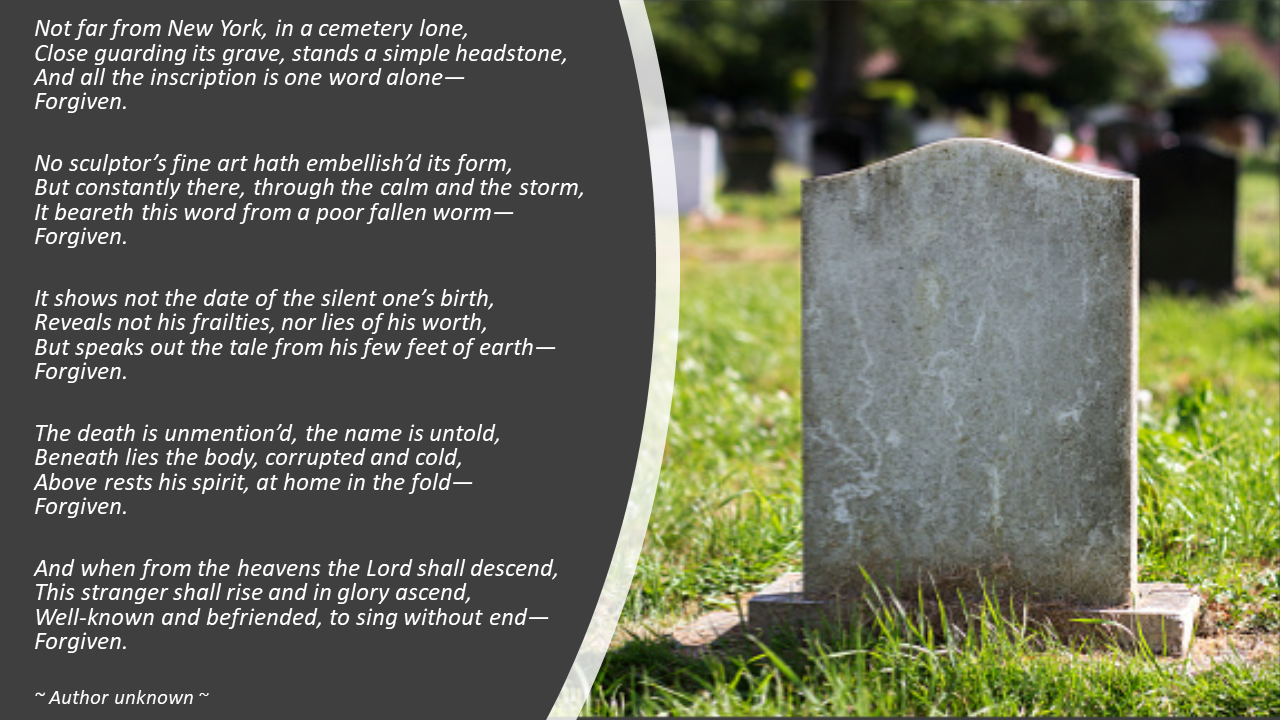If the YouTube video above is not available, here are two other ways to view:
Cave of Troubles
COR-20
050918AM
Cave of Troubles
To better understand 1st Samuel 22 this morning, think over the past two weeks as the stories about conditions in the New Orleans Superdome began to leak out; the descriptions boggled our senses.
Think of 20,000 bodies packed into that dark, cavernous space day after day–so many people, in such a small space, for so long–equaled a sickening stench of odor, multiplied by bathroom backups, the garbage that sat around too long, water that was dirty, food that was un-refrigerated.
All that—plus heat and humidity equaled a horrible fog that was hard to even describe. That was the Superdome 2005 surrounding Hurricane Katrina.
Now, go back three thousand years ago, to a similar scene. Put 400 men in a cave all at the same time. Add time, heat, and other attending conditions that life in a cave would bring. Multiply that by the fact that these men were all under duress and also fleeing great danger—Saul was after David so they were at risk for their lives. And you have the sights and smells of 1st Samuel 22.1.
As we turn to 1st Samuel 22 we are walking into David’s cave–think of the many descriptions of the Superdome you heard or read, and put this passage into that light.
As we go into the harsh conditions of the cave of Adullam we can start to see the emotional and physical furnace of adversity and affliction that David had entered.
Then we can fully see the depths of his insights recorded in these two Psalms. Because the next two Psalms we will study in depth—Psalms 57 and 142, are written from the context of 1st Samuel 22. Stand/pray
- 1 Samuel 22:1-4 David therefore departed from there and escaped to the cave of Adullam. So when his brothers and all his father’s house heard it, they went down there to him. 2 And everyone who was in distress, everyone who was in debt, and everyone who was discontented gathered to him. So he became captain over them. And there were about four hundred men with him. 3 Then David went from there to Mizpah of Moab; and he said to the king of Moab, “Please let my father and mother come here with you, till I know what God will do for me.” 4 So he brought them before the king of Moab, and they dwelt with him all the time that David was in the stronghold.
One truth gripped my heart the longer I studied this passage—this event is so relevant to our world today.
Often we are struck with the question in our minds–does God have any insights for me a 21st century believer faced with such challenges at work and at school? In other words, how do you make it in the classroom and workplace of America today?
- David found the key, and wrote down how God helped him to minister to these desperate men. The group that came to live and work around him were so representative of what the culture around us is all about. They were distressed, drowned by debt, and discontented with life. Isn’t that an apt description of an average American these days?
- David also learned how to not get dragged down by those around him. As we read these verses note the emotional condition of everyone that joined up with David. They were a very needy group. And in all their need, they invaded the life of someone just coming out of the pits. It was just the right recipe for a relapse by David into despair and a return into the pits. But the good news is—that didn’t happen, and the reason why is just what we are going to learn from God’s Word.
So let’s go to the place where David learned to live in the midst of troubled people. David was now making the cave of Adullam his headquarters. Adullam is a cave in the region between Hebron and Philistia. It is located in the canyon that was called Rephaim, which means the Valley of Giants. After David relocated there, and set up his headquarters, and men began to drift in and come to him. Then in the next chapter, we’re told: “So David and his men, about six hundred . . .” (1 Samuel 23:13). So this is a growing group that came for comfort and followed David. Three types of men came: those who were in distress, those who were in debt, and those who were discontented.
First, Those Who Were in Distress
“The men who came to him were, first of all, those who were in distress. Saul was in power, and David was rejected and out yonder in the caves. Saul persecuted and oppressed many of his subjects and these men who were in distress wanted deliverance and relief. They heard of David and went out to him. Many a man came into the camp of David in desperation and said, “I have been hounded like you have been hounded. I have been hated as you have been hated, and I have come to join up with you.”[1]
More and more we are realizing what distresses are surrounding people in these difficult days of finances, work pressures, family pressures, marriage pressures, and just plain old constant uncertainty. The school shootings, work shootings, domestic violence levels, and the evening news all testify to the deep distress Americans face each day. David’s cave mates were equally distressed.
So what kind of distress did these men who came to David face? Deep distress! How deep, you may wonder?
We can learn so much from the words that God inspired David to use to describe the condition of these hundreds of men surrounding him at this time.
The first word is those in distress (Hebrew word number 4689 matsowq) means squished and trapped and unable to escape. Here is an expansion on what that word means from other parts of the Bible.
- It is used for being at the end of your rope, feeling that death is knocking at your door, and no hope or help is possible. Deuteronomy 28:53-57 You shall eat the fruit of your own body, the flesh of your sons and your daughters whom the Lord your God has given you, in the siege and desperate straits in which your enemy shall distress you. 54 The sensitive and very refined man among you will be hostile toward his brother, toward the wife of his bosom, and toward the rest of his children whom he leaves behind, 55 so that he will not give any of them the flesh of his children whom he will eat, because he has nothing left in the siege and desperate straits in which your enemy shall distress you at all your gates. 56 The tender and delicate woman among you, who would not venture to set the sole of her foot on the ground because of her delicateness and sensitivity, will refuse to the husband of her bosom, and to her son and her daughter, 57 her placenta which comes out from between her feet and her children whom she bears; for she will eat them secretly for lack of everything in the siege and desperate straits in which your enemy shall distress you at all your gates.
- It is also a condition of deep sadness that can happen to even very strong believers like Ezra. Psalm 119:143 Trouble and anguish have overtaken me, Yet Your commandments are my delights.
- But in ordinary use, it stands for an unusually hopeless condition when people do things they would never do at any other time, but are willing to do—because they are in such distress. Jeremiah 19:9 And I will cause them to eat the flesh of their sons and the flesh of their daughters, and everyone shall eat the flesh of his friend in the siege and in the desperation with which their enemies and those who seek their lives shall drive them to despair.” ’
As we read these verses note the emotional condition of everyone that joined up with David. They were a very needy group that invaded David’s life right after his escape from the emotional pits. The good news is— David didn’t relapse into despair and a return into the pits. The reason why is just what we are going to learn from David’s responses.
First, we must always remember this is a spiritual battle. Who is calling the shots in this world? The god of this world, that is the Devil. Yes, the Almighty rules, but He has allowed Satan to run rampantly with evil through our world.
- 2 Corinthians 4:3-4 But even if our gospel is veiled, it is veiled to those who are perishing, 4 whose minds the god of this age has blinded, who do not believe, lest the light of the gospel of the glory of Christ, who is the image of God, should shine on them.
- 1 John 5:18 We know that whoever is born of God does not sin; but he who has been born of God keeps himself, and the wicked one does not touch him.
Second, Satan is the one who causes our problems and our difficulties in the world. The only way the world around us can escape this terminal distress is to flee Satan’s rule in their lives and come to Christ’s.
Turning to Christ, or repenting, is the only way to get rid of the distress of sin today. Every year we as American consume billions of pills to tranquilize our minds and bodies. They may offer temporary relief, but they won’t get rid of your distresses. Only Jesus Christ can give us peace and relief from our distress in this day.
Finally, Satan wants us to despair, feel abandoned, and give up. David found, as we can–that his soul was kept safely in the arms of the Lord to Whom he had fled for refuge.
- Hebrews 4:15-16 For we do not have a High Priest who cannot sympathize with our weaknesses, but was in all points tempted as we are, yet without sin. 16 Let us therefore come boldly to the throne of grace, that we may obtain mercy and find grace to help in time of need.
Now let’s examine the second group…
Those Who Were in Debt
 The Hebrew word for those in debt describes those who are hopelessly in debt. (Hebrew word number 5378 nasha means ‘money lent at usury’)
The Hebrew word for those in debt describes those who are hopelessly in debt. (Hebrew word number 5378 nasha means ‘money lent at usury’)
There was another group that came to David—those who were in debt. You see, God attempted to protect His people from debt because in that day a man in debt was actually in a terrible predicament. This is the law that God gave:
- If you lend money to any of My people who are poor among you, you shall not be like a moneylender to him; you shall not charge him interest. (Exodus 22:25)
God protected the poor. But apparently Saul did not enforce the Mosaic Law. And you’ll find out that even later on, during the time of Elisha, this was said:
- A certain woman of the wives of the sons of the prophets cried out to Elisha, saying, “Your servant my husband is dead, and you know that your servant feared the Lord. And the creditor is coming to take my two sons to be his slaves.” (2 Kings 4:1)
In Saul’s day, many men in debt were in danger of being sold into slavery. But before they could be taken into slavery, they ran off and joined up with David. That is the context of this passage. We have a similar problem facing us today as Americans.
We are surrounded by the pressures that our debt driven society heaps upon us. Competition, rivalry, discontentment, pride, and greed all combine to make Americans work long hours, multiple jobs—and still not have all they want. As a nation we are flooded worst than New Orleans was with water—with overwhelming debt! And the toll of the mental, physical, and emotional pressures and stresses we bear are mounting each day.
The National Public Debt that each of us as citizens of the USA collectively owe stood at $ 7,918,009,471,434.33 yesterday.
The US population on Saturday stood at: 295,734,134
That amounts to $26,774.08 each of us here this morning—man, woman, and child owes to our creditors mostly foreign investors. That means each of us are probably hopelessly in debt. it would take that to get America out of debt today.
So why don’t you pay your share? Well, most of us can’t pay; we are in debt. However, we all owe a greater debt that merely the dollars of the National Debt.
“I’m talking about a debt that sin has put us under. Our Lord taught His disciples to pray, “Forgive us our debts,” because we are in debt. And it was Paul who said to the Galatians,
- And I testify again to every man who becomes circumcised that he is a debtor to keep the whole law. (Galatians 5:3)
You and I today are debtors to measure up to God’s standard, and it is a debt we cannot pay. Paul says that we can’t; according to the flesh, we would never measure up.
- Therefore, brethren, we are debtors—not to the flesh, to live according to the flesh. (Romans 8:12)
If you attempt to live by the flesh, you will find yourself so far in debt you will never be able to ransom yourself out. But the hymn has it right: “He paid the debt and set us free.” When you and I were hopelessly and helplessly in debt, the Lord Jesus Christ went to the cross and paid that debt, and that is what forgiveness is today.” [2]
David knew his sins were forgiven, that was his surest and dearest possession. He confesses for all the world to hear:
- Psalm 32:1 Blessed is he whose transgression is forgiven, Whose sin is covered.
The joyful awareness of our unpayable debt of sin being paid in full by Christ is our strength as we go through life. We have confidence that we can face God someday because we know that the death of Jesus Christ God’s Son has forgiven us, His blood has cleansed us, and His life assures us that we will safely arrive at home with Him.
A poem captures this truth, based on a gravestone with just the word forgiven inscribed upon it.
Not far from New York, in a cemetery lone,
Close guarding its grave, stands a simple headstone,
And all the inscription is one word alone—Forgiven.
No sculptor’s fine art hath embellish’d its form,
But constantly there, through the calm and the storm,
It beareth this word from a poor fallen worm—Forgiven.
It shows not the date of the silent one’s birth,
Reveals not his frailties, nor lies of his worth,
But speaks out the tale from his few feet of earth—Forgiven.
The death is unmention’d, the name is untold,
Beneath lies the body, corrupted and cold,
Above rests his spirit, at home in the fold—Forgiven.
And when from the heavens the Lord shall descend,
This stranger shall rise and in glory ascend,
Well-known and befriended, to sing without end—Forgiven.
—Author unknown
As far as we know, David never paid the debt of any of his mighty men, but the Lord Jesus Christ went to the cross and paid my debt.
I can say today, “I’m forgiven”?
Can you say, “I am a forgiven sinner; He has forgiven me”? That’s the only way in the world you will ever get the real debt canceled, the one that determines your eternal destiny.
Those Who Were Discontented
Then the third group—those who were discontented—came to David. They were bitter of soul, discontented with life. Many in Israel who were attempting to make an honest living saw the injustice of Saul’s reign, saw the way things were going, and one day dropped their tools, left it all, and went out to join up with David. And many today who are discontented with this world know that they can’t find anything that satisfies in this world.
The Hebrew word for the discontented is actually the simple word for bitterness of the soul. Everyone who came to David had some poison of bitterness ravaging their soul. (Hebrew word number 4751 mar means ‘bitter’)
What a picture of the world we live around these Scriptural scenes portray. The word discontented or literally ‘bitter of soul’
- LIKE ESAU WHO LOST IT ALL. Genesis 27:34-35 When Esau heard the words of his father, he cried with an exceedingly great and bitter cry, and said to his father, “Bless me—me also, O my father!” 35 But he said, “Your brother came with deceit and has taken away your blessing.”
- LIKE THE POISONED WATERS OF MARAH. Exodus 15:23 Now when they came to Marah, they could not drink the waters of Marah, for they were bitter. Therefore the name of it was called Marah.
- LIKE THE WATER OF THE CURSE FOR INFIDELITY. Numbers 5:18Then the priest shall stand the woman before the Lord, uncover the woman’s head, and put the offering for remembering in her hands, which is the grain offering of jealousy. And the priest shall have in his hand the bitter water that brings a curse.
- LIKE THE HOPELESSNESS OF BITTER TEARS OVER CHILDLESSNESS FOR HANNAH. 1 Samuel 1:10 And she was in bitterness of soul, and prayed to the Lord and wept in anguish.
- LIKE THOSE ENRAGED BY FEAR. 2 Samuel 17:8 For,” said Hushai, “you know your father and his men, that they are mighty men, and they are enraged in their minds, like a bear robbed of her cubs in the field; and your father is a man of war, and will not camp with the people.
- LIKE THOSE AWAITING EXECUTION THAT HAVE NO HOPE. Esther 4:1 When Mordecai learned all that had happened, he tore his clothes and put on sackcloth and ashes, and went out into the midst of the city. He cried out with a loud and bitter cry.
- LIKE WORDS THAT ARE SPOKEN TO CAUSE INTENTIONAL WOUNDING AND PAIN. Psalm 64:3 Who sharpen their tongue like a sword, And bend their bows to shoot their arrows—bitter words,
All over the world today there is a simmering discontentment. We are really heading towards some dark days as Christ’s words foretold in Matthew 24. Because of the corruption and injustice of the world, a great many people are seeking a change. Are you discontented today?
These desperate men after listening to David became his mighty men who led his army to victory for 40 years! Personally, I think the greatest period in the life of David was the time when he was gathering mighty men around him[3].
If you stop to think about it—this is exactly what Christ is doing today. Jesus Christ is sending out the invitation. He is gathering a group of desperate sinners, hopelessly in debt because of sin, distressed with life, and discontented to the point of despair—and giving us life that is forgiven, and filled with His abundant joy.
Remember that all this trouble in David’s life started when God took the kingdom from Saul because he refused to live by the new heart God had given him.
- God then gave the kingdom to David because David was “a man after [God’s] own heart” (1 Sam. 13:14).
- David pleased God’s heart because God pleased David’s heart. “I will give thanks to the Lord with all my heart,” he sang (Ps. 9:1).
- David’s deepest desire was, “Let the words of my mouth and the meditation of my heart be acceptable in Thy sight, O Lord, my rock and my Redeemer” (Ps. 19:14).
- David prayed, “Examine me, O Lord, and try me; test my mind and my heart” (Ps. 26:2).
- And, when God told David, “Seek My face,” David’s heart replied, “Thy face, O Lord, I shall seek” (Ps. 27:8).
Where are you today? Still distressed, in debt and discontent? Or have you come to the One who died for you, offers to save you—and gives life that is real and abundant?
Are you forgiven? Do you know the security of fleeing to Christ as your personal refuge? If not do so today!
Now, where had David just arrived from when he entered the Cave at Adullam? David was fleeing from Saul.
First he went to Gath, a Philistine city, for help. When he realized that his life was also in danger there, he “acted insanely in their hands, and scribbled on the doors of the gate, and let his saliva run down into his beard” (1 Sam. 21:13). Thinking him to be mad, the Philistines let him go, and he was on his way to hide in the cave of Adullam. It was on that journey that David came to his senses and realized how foolish and unfaithful he had been to trust the Philistines for help instead of the Lord.
David was so discouraged about how he had failed the Lord that he felt abandoned—remember that as Psalm 13.
Then he felt like he was in the pits—remember that as Psalm 40 and 70.
But now as he walks to the Cave of Adullam he writes Psalm 57. It was there he wrote this Psalm as his resolve. It was there that he declared, “My heart is steadfast, O God, my heart is steadfast” (v. 7). He rededicated his heart, his innermost being, single-mindedly to God. David often failed, but his heart was fixed on God.[4]
Hiding from Saul Psalms 52 to 56; Cave starts 57
Some practical steps to overcome loneliness are these:
- Deal with sin. Be sure that there is no unconfessed or unforsaken sin left in your life to give the Devil a place in your life. (Eph. 4:27)
- Share your burdens. Clearly tell the Lord all your fears, all your struggles, all your pains—remember that He knows our frame that we are dust. (Psalm 103)
- Abandon all self-pity. Constant self-sorrow is a one way ticket to loneliness. Self-pity denies we have a responsibility to deal with our emotions and thus frustrates any cure. As Jesus said, coming after Him means we deny our self (Luke 9:23).
So we see that David suffers intense loneliness as he lives and works with a tough crowd. David wrote more Psalms in this period than at any other time in his life. These cave Psalms are 4, 57, 142—how to overcome the feelings of loneliness when we are far from home and feel exiled. In First Samuel 22:1-2 as he moved into a cave at Adullam with an incredibly difficult group of men, David wrote more Psalms than at any other time in his life. These cave Psalms are 4, 57, 142.
- We find in1 Sam. 24:16-22 the context for Psalm 57. Here we see David rising above discouragement by applying his great discoveries about God he learned in Psalm 142.
- Psalm 4 appeals for those slandering him v. 2-5.
- In Psalm 142 We see David calling on God because of his unfailing hope God was listening and hearing.
Psalm 57—Theme: A cry for mercy
This is the second michtam psalm, and it has an added title—Al-taschith, meaning “destroy not.” As we get into this psalm we will see that it has real meaning. It is inscribed “To the chief Musician, Al-taschith, Michtam of David, when he fled from Saul in the cave.”
This psalm brings us to another delightful cluster of psalms (56-60) known as the michtam psalms. What does michtam mean? It speaks of that which is substantial, or enduring, or fixed. Michtam literally means “engraven” or “permanent.” This word pictures that which is unmoveable, steadfast, stable and enduring. In Psalm 57:7 when David says, “My heart is fixed,” that is a michtam[5]
- Be merciful unto me, O God, be merciful unto me: for my soul trusteth in thee: yea, in the shadow of thy wings will I make my refuge, until these calamities be overpast [Ps. 57:1].
“In the shadow of thy wings will I make my refuge”—or as Dr. Gaebelein has it, “in the shadow of Thy wings will I find shelter.” David experienced this shelter. The nation of Israel did not, however. In Matthew 23:37 the Lord Jesus said, “O Jerusalem, Jerusalem, thou that killest the prophets, and stonest them which are sent unto thee, how often would I have gathered thy children together, even as a hen gathereth her chickens under her wings, and ye would not!” Israel has not as yet come under His wings. Are you ready to come under His wings? In other words, be obedient to Him, to love Him—Jesus said, “If ye love me, keep my commandments” (John 14:15)—and to walk in the Spirit?
Now notice these wonderful statements:
- He shall send from heaven, and save me from the reproach of him that would swallow me up. Selah. God shall send forth his mercy and his truth [Ps. 57:3].
This will be literally fulfilled for the faithful remnant when Christ returns in power and great glory; and they will say, “… Lo, this is our God; we have waited for him, and he will save us: this is the Lord; we have waited for him, we will be glad and rejoice in his salvation” (Isa. 25:9).
- My soul is among lions: and I lie even among them that are set on fire, even the sons of men, whose teeth are spears and arrows, and their tongue a sharp sword [Ps. 57:4].
Satan goes up and down this world like a roaring lion seeking whom he may devour (1 Pet. 5:8), and he has a lot of little lions helping him, by the way.
Remember that these michtam psalms have to do with that which is permanent and enduring, that which is substantial and lasting.
- My heart is fixed, O God, my heart is fixed: I will sing and give praise [Ps. 57:7].
David is saying—
- I’m not going back to trying to rescue myself like I did in Gath (Psalm 34) and miserably failed.
- I’m not going back to refusing to look at You and feeling abandoned (Psalm 13) and suffering through those long dark days.
- I’m not going back to laying in the mud of my sin and despair (Psalm 40, 70) in the pits of life.
No, my heart is fixed. I am holding on from now on to You! Then notice this beautiful expression:
- Awake up, my glory; awake, psaltery and harp: I myself will awake early [Ps. 57:8].
“I will wake the morning dawn” is Dr. Gaebelein’s translation. What a beautiful expression! The night of sin and suffering is over. Satan’s rule is finished, and the morning has come. The Sun of Righteousness has risen with healing in His wings. How wonderful! What assurance we find in this psalm.[6]
- My soul is among lions; I lie among the sons of men who are set on fire, whose teeth are spears and arrows, and their tongue a sharp sword . . . They have prepared a net for my steps. (Psalm 57:4, 6)
- HIS HOPE IS IN THE LORD. (v. 1-3) In his earlier life we see David in great distress. David’s problems in I Samuel 24 are the backdrop as he searches for strength in Psalm 57. He finds it in God Himself. Remember, he is in a weak time in life. This is when depression often hits.
- Psalm 57:1-3 Be merciful to me, O God, be merciful to me! For my soul trusts in You; And in the shadow of Your wings I will make my refuge, Until these calamities have passed by. 2 I will cry out to God Most High, To God who performs all things for me. 3 He shall send from heaven and save me; He reproaches the one who would swallow me up. God shall send forth His mercy and His truth.
- HIS STRENGTH COMES FROM THE LORD. (v. 1-11) Note that David talks about God seven times, That is a complete set. He is saying that God is enough. God and God alone is enough. He knew, and trusted, and rested in—the God who is enough!
- Psalm 57:1-11 Have mercy on me, O God, have mercy on me, for in you my soul takes refuge. I will take refuge in the shadow of your wings until the disaster has passed. I cry out to God Most High, to God, who fulfills his purpose for me. He sends from heaven and saves me, rebuking those who hotly pursue me; Selah God sends his love and his faithfulness. I am in the midst of lions; I lie among ravenous beasts — men whose teeth are spears and arrows, whose tongues are sharp swords. Be exalted, O God, above the heavens; let your glory be over all the earth. They spread a net for my feet — I was bowed down in distress. They dug a pit in my path — but they have fallen into it themselves. Selah My heart is steadfast, O God, my heart is steadfast; I will sing and make music. Awake, my soul! Awake, harp and lyre! I will awaken the dawn. I will praise you, O Lord, among the nations; I will sing of you among the peoples. For great is your love, reaching to the heavens; your faithfulness reaches to the skies. Be exalted, O God, above the heavens; let your glory be over all the earth. (NIV)
- HIS DISCOVERIES ARE NOW ABOUT THE LORD. (v. 1, 7, 11) For emphasis, note how David doubles three aspects of God’s nature.
- Psalm 57:1 Have mercy on me, O God, have mercy on me, for in you my soul takes refuge. I will take refuge in the shadow of your wings until the disaster has passed. And in v.7 My heart is steadfast, O God, my heart is steadfast; I will sing and make music. And in v. 11 Be exalted, O God, above the heavens; let your glory be over all the earth. (NIV)
 This is what David finds: God is Gracious, God is Steadfast, God is Praise Worthy. With this truth to hold onto, he testifies that it works. And he gets his focus off his troubles. He went beyond his cave world and onto Lord!!
This is what David finds: God is Gracious, God is Steadfast, God is Praise Worthy. With this truth to hold onto, he testifies that it works. And he gets his focus off his troubles. He went beyond his cave world and onto Lord!!
- Psalm 57:11 Be exalted, O God, above the heavens; Let Your glory be above all the earth.
Finally David gets God’s perspective that lifts him above the storm of Saul’s murderous pursuit, above the din of hundreds of needy and desperate men—and into the peaceful calm around the Throne of God! More than any self pity or gloom, he clings to the Lord. As a New Testament writer Paul reminds us:
- Romans 5:1-5 Therefore, having been justified by faith, we have peace with God through our Lord Jesus Christ, 2 through whom also we have access by faith into this grace in which we stand, and rejoice in hope of the glory of God. 3 And not only that, but we also glory in tribulations, knowing that tribulation produces perseverance; 4 and perseverance, character; and character, hope. 5 Now hope does not disappoint, because the love of God has been poured out in our hearts by the Holy Spirit who was given to us.
Psalm 142
What did this tough crowd around David do to him? They depressed him! How did David, so prone to doubt, discouragement and depression—overcome this hard, troublesome time? Psalm 142 holds the key!
David wrote more Psalms during this time–than at any other time in his life. These cave Psalms are 4, 57, 142—lessons on how to overcome the feelings of loneliness and abandonment when we are far from help, or away from home and feel unable to go on.
I wonder have you ever felt prehistoric? And I know if you’ve watched television very much you’ve seen the conditions of what cave men look like. For them life reduced to grunts and groans. And life is an endless pursuit of nothingness at times. I like the way Edna St. Vincent Mallay put it a few years ago she said: “life must go on . . . I just can’t remember why”.
That’s what I’m talking about— a cave man sort of existence. A life when a vicious swirl of getting up, going to work out of the home or in the home if you’re a mom— dropping into bed exhausted at the end of the day only to find out that the entire month has gone by and falling further behind instead of ahead. That’s the kind of life that I’m talking about and it’s not foreign to most of us. We know what it’s like; we know what it’s like when it’s hard.
David suffers intense loneliness as he feels abandoned while he begins to live and work with a tough crowd. In First Samuel 22:1-2 as he moved into a cave at Adullam with an incredibly difficult group of men.
What simple lessons can we find in cave times? Use lonely times to grow. One of the greatest truths we can discover is that lonely times usually accomplish great discoveries about God. David is at the depth of loneliness. He has been on the run for years and now he is hiding in a desolate cave in a crowd of malcontents, feeling very much alone. He has two choices. Stay in the cave of loneliness, descend into self-pity and sin or look up and use the time alone to grow.
Have you ever felt prehistoric? Have you ever come to the place life has been reduced to grunts and groans? As one poet expressed it, “life must go on . . . I just can’t remember why”.
Cave times are when life reduces to a vicious swirl. It becomes getting up, going through the day and dropping into bed exhausted only to fall further behind instead of ahead!
Trapped in a cave David baby sat four hundred fellow fugitives. That’s his address in Psalm 142. From the cave of Adullam he looks up and discovers some great truths about God. So can we.
 DAVID SINGS OF THIRSTING AND FINDING GOD WHEN I AM DISCOURAGED
DAVID SINGS OF THIRSTING AND FINDING GOD WHEN I AM DISCOURAGED
Psalm 142 is the classic confession of David when he was a caveman, alone and depressed. God satisfied him completely as he discovered great things about God. Remember, a heart that flees to God for refuge, will always be satisfied. That is the summary of the Life of David. What do we find as we examine the life of David? DAVID was always fleeing to Christ as his refuge. And this is THE SECRET OF A LIFE THAT IS SATISFIED AT ALL TIMES. In this overview of the dark days in David’s life, we see how his needs were always met by the Lord.
Cave times are usually accompanied by great distress. (v. 3-4 )
- Psalm 142:3-4 3 When my spirit was overwhelmed within me, Then You knew my path. In the way in which I walk They have secretly set a snare for me. 4 Look on my right hand and see, For there is no one who acknowledges me; Refuge has failed me; No one cares for my soul.
In the middle of great troubles there are usually some associated symptoms of depression.
- 1st David felt OVERWHELMED IN SPIRIT (v.3a): “Roof caving in!”; “Everything going wrong at once!”; “Always happens to me!”; “Not now!”; “I have some bad news”
- 2nd David thought his adversaries had HIDDEN A TRAP FOR ME (v.3b): “They’re all after me”; “I’ve been railroaded”; “Framed”
- 3rd David feared that NO ONE REGARDS ME (v.4a): “No one called…”; “I’m a nobody”; “Poor me…”; “I’m all alone”
- 4th NO ESCAPE FOR ME (v.4b): “One-way trip to nowhere”; “You’re TOO old”; “I’m sorry but the qualifications for this position…”
- Finally, NO ONE CARES FOR MY SOUL (v.4c)
Have you ever let THESE DEADENING THOUGHT CROSS YOUR MIND? They will bring gloom as fast as a storm front in a summer thunderstorm. But hold on –
Cave times usually Accomplish great discoveries about God (v. 5-7 )
- Psalm 142:5-7 5 I cried out to You, O Lord: I said, “You are my refuge, My portion in the land of the living. 6 Attend to my cry, For I am brought very low; Deliver me from my persecutors, For they are stronger than I. 7 Bring my soul out of prison, That I may praise Your name; The righteous shall surround me, For You shall deal bountifully with me.”
Why don’t you take a moment and mark these for someone else who may need them someday. Or even for you if you hit the dust. How’s your world? Caving in? Look now and find:
David is here Pursuing the only source of hope again. This was illustrated in the life of David. I Samuel 22:1-2 is the setting for Psalm 142 and the Cave of Adullam. What a great help that Psalm is when we are hurting.
Guess what David does? Psalm 142:5-7 is the answer.
Trapped in a cave David baby sat four hundred fellow fugitives. That’s his address in Psalm 142. From the cave of Adullam he looks up and discovers some great truths about God. So can we.
- OVERWHELMED IN SPIRIT (v.3)
“Roof caving in!”
“Everything going wrong at once!”
“Always happens to me!”
“Not now!”
“I have some bad news”
- HIDDEN A TRAP FOR ME
“They’re all after me”
“I’ve been railroaded”
“Framed”
- NO ONE REGARDS ME (v.4)
“No one called…”
“I’m a nobody”
“Poor me…”
“I’m all alone”
- NO ESCAPE FOR ME
“One-way trip to nowhere”
“You’re TOO old”
“I’m sorry but the qualifications for this position…”
YES, NO ONE CARES FOR MY SOUL
- In Psalm 142 we see him calling on God because of an unmistakable hope God was hearing.
– David stood for God because he was concerned for God’s name.
– David depended on God because he trusted God ‘s caring.
– David magnified God because he acknowledged God watching.
– David called on God because he hoped God was hearing.
Now to the conclusion as the caveman confesses the end result of acting upon these great discoveries about God:
- v.1a – God is Gracious
Look to Exodus 33:12 – 34:6
God is gracious to even save us
So sinful…
- v.1b – God is Refuge
He said it is Psalm 142:5
He says it here…
Look at Psalm 91
God is our shelter, protection, covering and shade
The cross is our safe harbor Hebrews 6:19 – anchored!
- v.2 – God accomplishes
Interlude – enemy without because enemy within v. 4/6
Solution – v.5 focus on God
v.6 God saves
- v.7a – God Establishes
See Psalm 40 5x He….
Inclined to me,
heard my cry,
brought me up
Set my feet
Put a new song
- v.7b – God makes us praise through sorrow
- v.8-9 – God makes us thankful
- v.9b – God opens an audience to us…
- v. 10 – God is loyal
Lamentations 3 – mercies fail not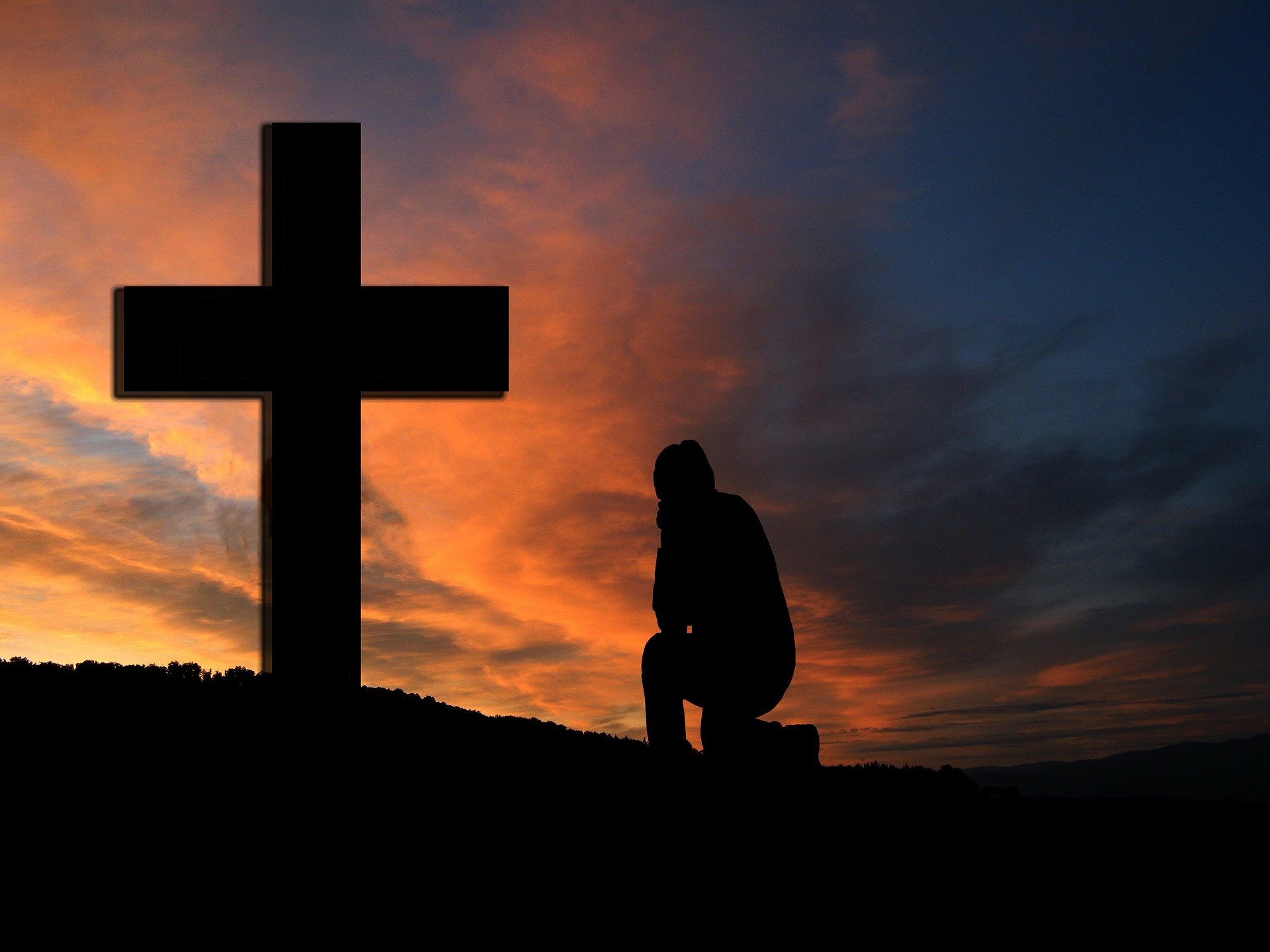
- v.11 – God uses adoring His name to pull us out of the cave to Him!
As we look there, why don’t you take a moment and mark these for someone else who may need them someday. Or even for you if you ever feel the twinge of loneliness in your life. Look now and find:
- When alone I learn that You alone are my true REFUGE. Psalm 142:5a: loneliness means its time to flee to the Lord my Refuge. I will believe Your promise and turn to You as my Refuge right now.
- When alone I learn that You alone are my true PORTION. Psalm 142:5b: loneliness means its time to feed on the Lord my Portion. I will believe Your promise to be all I need in this hard time.
- When alone I learn that You alone are my true LISTENER. Psalm 142:6 ‘Give heed my cry’: loneliness means its time to speak to the Lord my Master. I will believe Your promise and pour out all my troubles to You who care for me.
- When alone I learn that You alone are my true DELIVERER “bring” Psalm 142:7a: loneliness means its time to trust in the Lord my Redeemer. I will believe Your promise and let You rescue me now.
- When alone I learn that You alone are my true OBJECT OF WORSHIP Psalm 142:7b: loneliness means its time to offer worship to the Lord my Lord. I will believe Your promise and worship You even when I don’t feel like it.
- When alone I learn that You alone are my true PROVIDER “surround” Psalm 142:7c: loneliness means its time to rest in the Lord my Provider. I will believe Your promise and let You surround me now with everything I need.
Ever felt prehistoric? A life reduced to grunts and groans? As one poet expressed it, “life must go on . . . I just can’t remember why”. A vicious swirl of getting up, going through the day and dropping into bed exhausted only to fall further behind instead of ahead? Trapped in a cave David baby-sat four hundred fellow fugitives. That’s his address in Psalm 142. From the cave of Adullam he looks up and discovers some great truths about God. So can we.
Cave times often slide in right after our victories as David discovered. As “the hero” David toppled the #1 Villain of the hour (Goliath) and lived to tell about it (I Samuel 17). As “Mr. Brave” David escaped an assassination attempt by Saul (I Samuel 19). As “Mr. Clever” David acted his way out of the presence of the dreadful commander of the Philistines ( I Samuel 21). In our text we meet David running for his life, caring for his family and hosting all these malcontents.
Cave life yields great discoveries about God. David sings them in Psalm 142. Listen to the confessions of this caveman: “Lord of Refuge, You are my Portion” ( v.5), “O Listening One, hear my cry and Rescue me (v.6). My God who Provides the righteous to gather about me, You are Sufficient” (v. 7). How’s your world? Caving in? Why not look out of your need and find the courage needed in the One David found sufficient!
————–
Deterring Immorality by Counting Its Cost
The exorbitant Price of Sexual Sin
by Randy Alcorn
In 1850 Nathaniel Hawthorne published The Scarlet Letter, a powerful novel centered around the adulterous relationship of Hester Prynne and the highly respected minister, Reverend Mr. Arthur Dimmesdale. The fallen pastor, remorseful but not ready to face the consequences, asks the question, “What can a ruined soul, like mine, effect towards the redemption of other souls?-or a polluted soul, towards their purification?” He describes the misery of standing in his pulpit and seeing the admiration of his people, and having to “then look inward, and discern the black reality of what they idolize.” Finally he says, “I have laughed, in bitterness and agony of heart, at the contrast between what I seem and what I am! And Satan laughs at it!”
Ruined, polluted, black reality, bitterness, agony. And perhaps, worst of all, Satan’s laugh. These are just some of the consequences of sexual immorality in the life of one known as a follower of God.
I met with a man who had been a leader in a Christian organization until he committed immorality. I asked him, “What could have been done to prevent this?” He paused only for a moment, then said with haunting pain and precision, “If only I had really known, really thought through and weighed what it would cost me and my family and my Lord, I honestly believe I would never have done it.”
Some years ago my friend Alan Hlavka and I both developed lists of all the specific consequences we could think of that would result from our immorality as pastors. The lists were devastating, and to us they spoke more powerfully than any sermon or article on the subject.
Periodically, especially when travelling or when in a time of temptation or weakness, we read through this list. In a personal and tangible way it brings home God’s inviolate law of choice and consequence. It cuts through the fog of rationalization and fills our hearts with the healthy, motivating fear of God. We find that when we begin to think unclearly, reviewing this list yanks us back to the reality of the law of the harvest and the need both to fear God and the consequences of sin.
An edited version of our combined lists follows. I’ve included the actual names of my wife and daughters to emphasize the personal nature of this exercise. Where it involves my own lists of specific people’s names, I’ve simply stated “list names” so the reader can insert the appropriate ones in his own life.
Some of these consequences would be unique to me, just as some of yours would be unique to you. I recommend that you use this as the basis for your own list, then include those other consequences that would be uniquely yours. The idea, of course, is not to focus on sin, but on the consequences of sin, thereby encouraging us to refocus on the Lord and take steps of wisdom and purity that can keep us from falling.
(While God can forgive and bring beauty out of ashes, that’s a message to those who have already sinned…not to those who are contemplating sin! On the “front side” of sin we must not give assurances of forgiveness and restoration. We must put the focus where Scripture does-on the love of God and the fear of God, both of which should act in concert to motivate us to holy obedience.)
Personalized List of Anticipated Consequences of Immorality
- Grieving my Lord; displeasing the One whose opinion most matters.
- Dragging into the mud Christ’s sacred reputation.
- Loss of reward and commendation from God.
- Having to one day look Jesus in the face at the judgment seat and give an account of why I did it.
- Forcing God to discipline me in various ways.
- Following in the footsteps of men I know of whose immorality forfeited their ministry and caused me to shudder. List of these names:
- Suffering of innocent people around me who would get hit by my shrapnel (a la Achan).
- Untold hurt to Nanci, my best friend and loyal wife.
- Loss of Nanci’s respect and trust.
- Hurt to and loss of credibility with my beloved daughters, Karina and Angela. (“Why listen to a man who betrayed Mom and us?”)
- If my blindness should continue or my family be unable to forgive, I could lose my wife and my children forever.
- Shame to my family. (“Why isn’t Daddy a pastor anymore?”; the cruel comments of others who would invariably find out.)
- Shame to my church family.
- Shame and hurt to my fellow pastors and elders. List of names:
- Shame and hurt to my friends, and especially those I’ve led to Christ and discipled. List of names:
- Guilt awfully hard to shake-even though God would forgive me, would I forgive myself?
- Plaguing memories and flashbacks that could taint future intimacy with my wife.
- Disqualifying myself after having preached to others.
- Surrender of the things I am called to and love to do-teach and preach and write and minister to others. Forfeiting forever certain opportunities to serve God. Years of training and experience in ministry wasted for a long period of time, maybe permanently.
- Being haunted by my sin as I look in the eyes of others, and having it all dredged up again wherever I go and whatever I do.
- Undermining the hard work and prayers of others by saying to our community “this is a hypocrite-who can take seriously anything he and his church have said and done?”
- Laughter, rejoicing and blasphemous smugness by those who disrespect God and the church (2 Samuel 12:14).
- Bringing great pleasure to Satan, the Enemy of God.
- Heaping judgment and endless problems on the person I would have committed adultery with.
- Possible diseases: gonorrhea, syphilis, chlamydia, herpes, and AIDS (pain, constant reminder to me and my wife, possible infection of Nanci, or in the case of AIDS, even causing her death, as well as mine.)
- Possible pregnancy, with its personal and financial implications, including a lifelong reminder of sin to me and my family.
- Loss of self-respect, discrediting my own name, and invoking shame and lifelong embarrassment upon myself.
These are only some of the consequences. If only we would rehearse in advance the ugly and overwhelming consequences of immorality, we would be far more prone to avoid it. May we live each day in the love and fear of God.
Suppose I said, “There’s a great-looking girl down the street. Let’s go look through her window and watch her undress, then pose for us naked, from the waist up. Then this girl and her boyfriend will get in a car and have sex – let’s listen and watch the windows steam up!”
You’d be shocked. You’d think, What a pervert!
But suppose instead I said, “Hey, come on over. Let’s watch Titanic.”
Christians recommend this movie, church youth groups view it together, and many have shown it in their homes. Yet the movie contains precisely the scenes I described.
So, as our young men lust after bare breasts on the screen, our young women are trained in how to get a man’s attention.
How does something shocking and shameful somehow become acceptable because we watch it through a television instead of a window?
In terms of the lasting effects on our minds and morals, what’s the difference?
Yet many think, Titanic? Wonderful! It wasn’t even rated R!
Every day Christians across the country, including many church leaders, watch people undress through the window of television. We peek on people committing fornication and adultery, which our God calls an abomination.
We’ve become voyeurs, Peeping Toms, entertained by sin.
Normalizing evil
The enemy’s strategy is to normalize evil. Consider young people struggling with homosexual temptation. How does it affect them when they watch popular television dramas where homosexual partners live together in apparent normality?
Parents who wouldn’t dream of letting a dirty-minded adult baby-sit their children do it every time they let their kids surf the channels. Not only we, but our children become desensitized to immorality. Why are we surprised when our son gets a girl pregnant if we’ve allowed him to watch hundreds of immoral acts and hear thousands of jokes with sexual innuendos?
But it’s just one little sex scene.
Suppose I offered you a cookie, saying, “A few mouse droppings fell in the batter, but for the most part it’s a great cookie –you won’t even notice.”
“To fear the LORD is to hate evil” (Proverbs 8:13). When we’re being entertained by evil, how can we hate it? How can we be pure when we amuse ourselves with impurity?
God warns us not to talk about sex inappropriately:
“But among you there must not be even a hint of sexual immorality, or of any kind of impurity… because these are improper for God’s holy people. Nor should there be obscenity, foolish talk or coarse joking, which are out of place” (Ephesians 5:3-4).
How do our favorite dramas and sitcoms stand up to these verses? How about Seinfeld and other nightly reruns? Do they contain “even a hint of sexual immorality” or “coarse joking”? If we can listen to late night comedians’ monologues riddled with immoral references, are we really fearing God and hating evil?
Jesus, the radical
Consider Christ’s words:
“You have heard that it was said, ‘Do not commit adultery.’ But I tell you that anyone who looks at a woman lustfully has already committed adultery with her in his heart. If your right eye causes you to sin, gouge it out and throw it away. It is better for you to lose one part of your body than for your whole body to be thrown into hell. And if your right hand causes you to sin, cut it off and throw it away. It is better for you to lose one part of your body than for your whole body to go into hell” (Matthew 5:27-30).
Why does Jesus paint this shocking picture? I believe He wants us to take radical steps, to do whatever is necessary to deal with sexual temptation.
Now, the hand and eye are not the causes of sin. A blind man can still lust and a man without a hand can still steal. But the eye is a means of access for both godly and ungodly input. And the hand is a means of performing righteous or sinful acts. We must therefore govern what the eye looks at and the hand does.
If we take Jesus seriously, we need to think far more radically about sexual purity.
Doing what it takes
The battle is too intense, and the stakes are too high to approach purity casually or gradually.
So … if you can’t keep your eyes away from those explicit images, don’t ever go to a video rental store. Come on. Everybody goes into those stores.
No. If it causes you to sin, you shouldn’t. Period.
Do your thoughts trip you up when you’re with certain persons? Stop hanging out with them. Does a certain kind of music charge you up erotically? Stop listening to it. Do you make phone calls you shouldn’t? Block 900 phone sex numbers so you can’t call them from your home.
If these things seem like crutches, fine. Use whatever crutches you need to help you walk.
Some men fall into mental adultery through lingerie ads, billboards, women joggers in tight pants, women with low cut blouses or short skirts, cheerleaders or dancers, movies, TV shows, and commercials of the beer-and-bikini variety. Some men’s weakness is the Sunday newspaper’s ad inserts or nearly any magazine.
So, stop looking. And then stop putting yourself in the position to look!
If you have to get rid of your TV to guard your purity, do it.
If it means you can’t go to games because of how dancers or cheerleaders dress and perform, so be it. If it means you have to lower your head and close your eyes, so be it. If you’re embarrassed to do that, stay home.
Tell your wife about your struggles. Or if you’re single, tell a godly friend. If you need to drop the newspaper because of those ads, fine. If you need your wife to go through it first and pull out the offending inserts, ask her.
Romans 13:14 instructs us to “make no provision for the flesh” (NASB). It’s a sin to deliberately put ourselves in a position where we’ll likely commit sin. Whether it’s the lingerie department, the swimming pool, or the workout room at an athletic club, if it trips you up, stay away from it.
Proverbs describes the loose woman meeting up with the foolish man after dark (see Proverbs 7:8-9). We must stay away from people, places, and contexts that make sin more likely.
If it’s certain bookstores or hangouts, stay away from them. If cable or satellite TV or network TV, old friends from high school, the Internet, or computers are your problem, get rid of them.
Just say no to whatever is pulling you away from Jesus. Remember, if you want a different outcome, you must make different choices.
If you can’t be around women wearing swimsuits without looking and lusting, then don’t go on vacation where women wear swimsuits. If that means not going water-skiing or to a favorite resort, fine. If it means being unable to go on a church-sponsored retreat, don’t go.
Sound drastic? Compare it to gouging out an eye or cutting off a hand!
“But…”
But there are hardly any decent TV shows anymore. Then stop watching TV. Read books. Have conversations.
But all the newer novels have sex scenes. Then read the old novels. Read fiction from Christian publishers.
But I’ve subscribed to Sports Illustrated for thirty years, back before they had the swimsuit issue. They have it now. So drop your subscription. And tell them why.
But it’s almost impossible to rent a movie without sex and offensive language. There are Christian movie review sites that can help you make good selections for family viewing. There are also services which offer edited movies, television adaptors which edit profanity, and DVD software that cuts offensive scenes from movies.
But suppose there were no decent movies – what then? I enjoy good movies, but the Bible never commands us, “Watch movies.” It does command us, “Guard your heart.”
It’s a battle – battles get bloody. Do whatever it takes to walk in purity!
A friend wrote a daily contract that asks these questions: “Are you willing to do whatever’s necessary to protect your sexual sobriety? Ask God for help? Call on others? Go to meetings? Read literature? Set boundaries and not cross them? Be brutally honest?”
Too radical?
But you’re talking about withdrawing from the culture. What you’re saying is too radical.
No, what I’m saying is nothing. Jesus said, “If it would keep you from sexual temptation, you’d be better off poking out your eye and cutting off your hand.” Now that’s radical.
Many claim they’re serious about purity, but then they say, “No way; I’m not going to give up cable TV,” or “I’m not going to have my wife hold the computer password.”
Followers of Jesus have endured torture and given their lives in obedience to Him. And we’re whining about giving up cable?
When Jesus called us to take up our crosses and follow Him (see Matthew 10:38), didn’t that imply sacrifices greater than forgoing Internet access?
How sold out are you to the battle for purity? How desperate are you to have victory over sin? How radical are you willing to get for your Lord? How much do you want the joy and peace that can be found only in Him? Purity comes only to those who truly want it.
Controlling the Internet
• Use family-friendly Internet service providers. Install a pornography-filtering program on your computer, realizing it can’t screen out everything. Ask someone else to hold the password. Ask someone to regularly check your Internet usage history.
• Use family-friendly Internet service providers. Install a pornography-filtering program on your computer, realizing it can’t screen out everything. Ask someone else to hold the password. Ask someone to regularly check your Internet usage history.
• Move computers to high-traffic areas. Unless you have a proven history of going on-line safely, don’t log on to the Internet if you’re alone. Be sure the monitor always faces an open door, where others can see what you’re looking at (1 Corinthians 10:13).
• If you’re still losing the battle, disconnect the Internet — or get rid of the computer.
Taking charge of the TV
• Consult a schedule to choose appropriate programs. Channel-surfing invites temptation.
• Keep your television unplugged, store it in a closet, or put it in the garage to prevent mindless flip-on.
• Use the “off” switch freely. Use the remote quickly when temptation comes. Have a safe channel ready to turn to.
• Don’t allow young children to choose their own programs. As they get older they can choose, but parents have veto power. Avoid multiple TVs that split the family and leave children unsupervised. Don’t use television as a babysitter.
• Spend an hour reading Scripture, a Christian book, or participating in a ministry for each hour you watch TV. Even when television isn’t bad, it often keeps us from what’s better.
• Drop cable, HBO, your satellite dish, or your TV if it is promoting ungodliness in your home. (This isn’t legalism — it’s discipleship.)
• Periodically “fast” from television for a week or a month. Watch what happens; see if you like what you can do with all that time (including feeding your passion for Christ).
[1] McGee, J. Vernon, David: A Man After God’s Own Heart, (Nashville, TN: Thomas Nelson Inc.) 2001, c2000.
[2] McGee, J. Vernon, David: A Man After God’s Own Heart, (Nashville, TN: Thomas Nelson Inc.) 2001, c2000.
[3] McGee, J. Vernon, David: A Man After God’s Own Heart, (Nashville, TN: Thomas Nelson Inc.) 2001, c2000.
[4] MacArthur, John F., The MacArthur New Testament Commentary, (Chicago: Moody Press) 1983.
[5]McGee, J. Vernon, Thru the Bible with J. Vernon McGee, (Nashville: Thomas Nelson Publishers) 2000, c1981.
[6]McGee, J. Vernon, Thru the Bible with J. Vernon McGee, (Nashville: Thomas Nelson Publishers) 2000, c1981.
Slides
Check Out All The Sermons In The Series
You can find all the sermons and short clips from this series, Christ our Refuge here.
Looking To Study The Bible Like Dr. Barnett?
Dr. Barnett has curated an Amazon page with a large collection of resources he uses in his study of God’s Word. You can check it out here.





